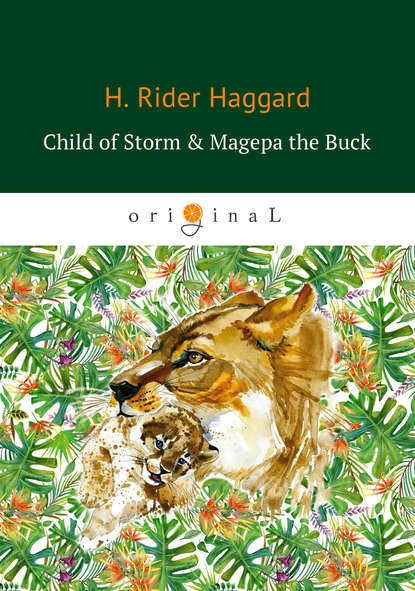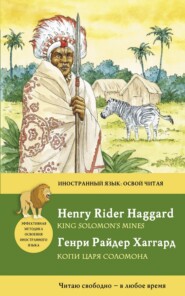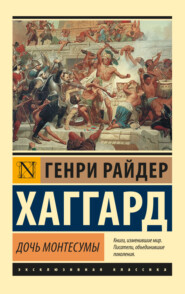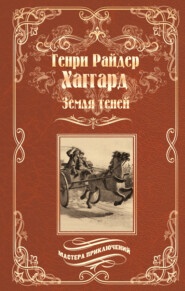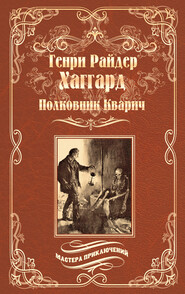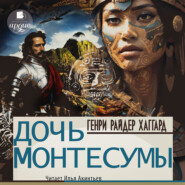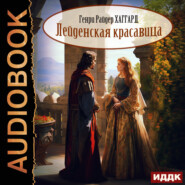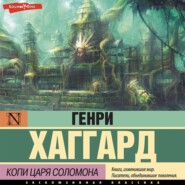По всем вопросам обращайтесь на: info@litportal.ru
(©) 2003-2024.
✖
Child of Storm & Magepa the Buck
Автор
Серия
Год написания книги
2018
Настройки чтения
Размер шрифта
Высота строк
Поля
“I heard it from one Saduko” – here she frowned a little – “and others, and I knew you because you are so beautiful” – an incautious speech at which she broke into a dazzling smile and tossed her deer-like head.
“Am I?” she asked. “I never knew it, who am only a common Zulu girl to whom it pleases the great white chief to say kind things, for which I thank him”; and she made a graceful little reverence, just bending one knee. “But,” she went on quickly, “whatever else I be, I am of no knowledge, not fit to tend you who are hurt. Shall I go and send my oldest mother?”
“Do you mean her whom your father calls the ‘Worn-out-old-Cow,’ and whose ear he shot off?”
“Yes, it must be she from the description,” she answered with a little shake of laughter, “though I never heard him give her that name.”
“Or if you did, you have forgotten it,” I said dryly. “Well, I think not, thank you. Why trouble her, when you will do quite as well? If there is milk in that gourd, perhaps you will give me a drink of it.”
She flew to the bowl like a swallow, and next moment was kneeling at my side and holding it to my lips with one hand, while with the other she supported my head.
“I am honoured,” she said. “I only came to the hut the moment before you woke, and seeing you still lost in swoon, I wept – look, my eyes are still wet [they were, though how she made them so I do not know] – for I feared lest that sleep should be but the beginning of the last.”
“Quite so,” I said; “it is very good of you. And now, since your fears are groundless – thanks be to the heavens – sit down, if you will, and tell me the story of how I came here.”
She sat down, not, I noted, as a Kafir woman ordinarily does, in a kind of kneeling position, but on a stool.
“You were carried into the kraal, Inkoosi,” she said, “on a litter of boughs. My heart stood still when I saw that litter coming; it was no more heart; it was cold iron, because I thought the dead or injured man was – “ And she paused.
“Saduko?” I suggested.
“Not at all, Inkoosi – my father.”
“Well, it wasn’t either of them,” I said, “so you must have felt happy.”
“Happy! Inkoosi, when the guest of our house had been wounded, perhaps to death – the guest of whom I have heard so much, although by misfortune I was absent when he arrived.”
“A difference of opinion with your eldest mother?” I suggested.
“Yes, Inkoosi; my own is dead, and I am not too well treated here. She called me a witch.”
“Did she?” I answered. “Well, I do not altogether wonder at it; but please continue your story.”
“There is none, Inkoosi. They brought you here, they told me how the evil brute of a buffalo had nearly killed you in the pool; that is all.”
“Yes, yes, Mameena; but how did I get out of the pool?”
“Oh, it seems that your servant, Sikauli, the bastard, leapt into the water and engaged the attention of the buffalo which was kneading you into the mud, while Saduko got on to its back and drove his assegai down between its shoulders to the heart, so that it died. Then they pulled you out of the mud, crushed and almost drowned with water, and brought you to life again. But afterwards you became senseless, and so lay wandering in your speech until this hour.”
“Ah, he is a brave man, is Saduko.”
“Like others, neither more nor less,” she replied with a shrug of her rounded shoulders. “Would you have had him let you die? I think the brave man was he who got in front of the bull and twisted its nose, not he who sat on its back and poked at it with a spear.”
At this period in our conversation I became suddenly faint and lost count of things, even of the interesting Mameena. When I awoke again she was gone, and in her place was old Umbezi, who, I noticed, took down a mat from the side of the hut and folded it up to serve as a cushion before he sat himself upon the stool.
“Greeting, Macumazahn,” he said when he saw that I was awake; “how are you?”
“As well as can be hoped,” I answered; “and how are you, Umbezi?”
“Oh, bad, Macumazahn; even now I can scarcely sit down, for that bull had a very hard nose; also I am swollen up in front where Sikauli struck me when he tumbled out of the tree. Also my heart is cut in two because of our losses.”
“What losses, Umbezi?”
“Wow! Macumazahn, the fire that those low fellows of mine lit got to our camp and burned up nearly everything – the meat, the skins, and even the ivory, which it cracked so that it is useless. That was an unlucky hunt, for although it began so well, we have come out of it quite naked; yes, with nothing at all except the head of the bull with the cleft horn, that I thought you might like to keep.”
“Well, Umbezi, let us be thankful that we have come out with our lives – that is, if I am going to live,” I added.
“Oh, Macumazahn, you will live without doubt, and be none the worse. Two of our doctors – very clever men – have looked at you and said so. One of them tied you up in all those skins, and I promised him a heifer for the business, if he cured you, and gave him a goat on account. But you must lie here for a month or more, so he says. Meanwhile Panda has sent for the hides which he demanded of me to be made into shields, and I have been obliged to kill twenty-five of my beasts to provide them – that is, of my own and of those of my headmen.”
“Then I wish you and your headmen had killed them before we met those buffalo, Umbezi,” I groaned, for my ribs were paining me very much. “Send Saduko and Sikauli here; I would thank them for saving my life.”
So they came, next morning, I think, and I thanked them warmly enough.
“There, there, Baas,” said Scowl, who was literally weeping tears of joy at my return from delirium and coma to the light of life and reason; not tears of Mameena’s sort, but real ones, for I saw them running down his snub nose, that still bore marks of the eagle’s claws. “There, there, say no more, I beseech you. If you were going to die, I wished to die, too, who, if you had left it, should only have wandered through the world without a heart. That is why I jumped into the pool, not because I am brave.”
When I heard this my own eyes grew moist. Oh, it is the fashion to abuse natives, but from whom do we meet with more fidelity and love than from these poor wild Kafirs that so many of us talk of as black dirt which chances to be fashioned to the shape of man?
“As for myself, Inkoosi,” added Saduko, “I only did my duty. How could I have held up my head again if the bull had killed you while I walked away alive? Why, the very girls would have mocked at me. But, oh, his skin was tough. I thought that assegai would never get through it.”
Observe the difference between these two men’s characters. The one, although no hero in daily life, imperils himself from sheer, dog-like fidelity to a master who had given him many hard words and sometimes a flogging in punishment for drunkenness, and the other to gratify his pride, also perhaps because my death would have interfered with his plans and ambitions in which I had a part to play. No, that is a hard saying; still, there is no doubt that Saduko always first took his own interests into consideration, and how what he did would reflect upon his prospects and repute, or influence the attainment of his desires. I think this was so even when Mameena was concerned – at any rate, in the beginning – although certainly he always loved her with a single-hearted passion that is very rare among Zulus.
Presently Scowl left the hut to prepare me some broth, whereon Saduko at once turned the talk to this subject of Mameena.
He understood that I had seen her. Did I not think her very beautiful?
“Yes, very beautiful,” I answered; “indeed, the most beautiful Zulu woman I have ever seen.”
And very clever – almost as clever as a white?
“Yes, and very clever – much cleverer than most whites.”
And – anything else?
“Yes; very dangerous, and one who could turn like the wind and blow hot and blow cold.”
“Ah!” he said, thought a while, then added: “Well, what do I care how she blows to others, so long as she blows hot to me.”
“Well, Saduko, and does she blow hot for you?”
“Not altogether, Macumazahn.” Another pause. “I think she blows rather like the wind before a great storm.”
“That is a biting wind, Saduko, and when we feel it we know that the storm will follow.”
“I dare say that the storm will follow, Inkoosi, for she was born in a storm and storm goes with her; but what of that, if she and I stand it out together? I love her, and I had rather die with her than live with any other woman.”
“The question is, Saduko, whether she would rather die with you than live with any other man. Does she say so?”
“Inkoosi, Mameena’s thought works in the dark; it is like a white ant in its tunnel of mud. You see the tunnel which shows that she is thinking, but you do not see the thought within. Still, sometimes, when she believes that no one beholds or hears her” – here I bethought me of the young lady’s soliloquy over my apparently senseless self – “or when she is surprised, the true thought peeps out of its tunnel. It did so the other day, when I pleaded with her after she had heard that I killed the buffalo with the cleft horn.
“Am I?” she asked. “I never knew it, who am only a common Zulu girl to whom it pleases the great white chief to say kind things, for which I thank him”; and she made a graceful little reverence, just bending one knee. “But,” she went on quickly, “whatever else I be, I am of no knowledge, not fit to tend you who are hurt. Shall I go and send my oldest mother?”
“Do you mean her whom your father calls the ‘Worn-out-old-Cow,’ and whose ear he shot off?”
“Yes, it must be she from the description,” she answered with a little shake of laughter, “though I never heard him give her that name.”
“Or if you did, you have forgotten it,” I said dryly. “Well, I think not, thank you. Why trouble her, when you will do quite as well? If there is milk in that gourd, perhaps you will give me a drink of it.”
She flew to the bowl like a swallow, and next moment was kneeling at my side and holding it to my lips with one hand, while with the other she supported my head.
“I am honoured,” she said. “I only came to the hut the moment before you woke, and seeing you still lost in swoon, I wept – look, my eyes are still wet [they were, though how she made them so I do not know] – for I feared lest that sleep should be but the beginning of the last.”
“Quite so,” I said; “it is very good of you. And now, since your fears are groundless – thanks be to the heavens – sit down, if you will, and tell me the story of how I came here.”
She sat down, not, I noted, as a Kafir woman ordinarily does, in a kind of kneeling position, but on a stool.
“You were carried into the kraal, Inkoosi,” she said, “on a litter of boughs. My heart stood still when I saw that litter coming; it was no more heart; it was cold iron, because I thought the dead or injured man was – “ And she paused.
“Saduko?” I suggested.
“Not at all, Inkoosi – my father.”
“Well, it wasn’t either of them,” I said, “so you must have felt happy.”
“Happy! Inkoosi, when the guest of our house had been wounded, perhaps to death – the guest of whom I have heard so much, although by misfortune I was absent when he arrived.”
“A difference of opinion with your eldest mother?” I suggested.
“Yes, Inkoosi; my own is dead, and I am not too well treated here. She called me a witch.”
“Did she?” I answered. “Well, I do not altogether wonder at it; but please continue your story.”
“There is none, Inkoosi. They brought you here, they told me how the evil brute of a buffalo had nearly killed you in the pool; that is all.”
“Yes, yes, Mameena; but how did I get out of the pool?”
“Oh, it seems that your servant, Sikauli, the bastard, leapt into the water and engaged the attention of the buffalo which was kneading you into the mud, while Saduko got on to its back and drove his assegai down between its shoulders to the heart, so that it died. Then they pulled you out of the mud, crushed and almost drowned with water, and brought you to life again. But afterwards you became senseless, and so lay wandering in your speech until this hour.”
“Ah, he is a brave man, is Saduko.”
“Like others, neither more nor less,” she replied with a shrug of her rounded shoulders. “Would you have had him let you die? I think the brave man was he who got in front of the bull and twisted its nose, not he who sat on its back and poked at it with a spear.”
At this period in our conversation I became suddenly faint and lost count of things, even of the interesting Mameena. When I awoke again she was gone, and in her place was old Umbezi, who, I noticed, took down a mat from the side of the hut and folded it up to serve as a cushion before he sat himself upon the stool.
“Greeting, Macumazahn,” he said when he saw that I was awake; “how are you?”
“As well as can be hoped,” I answered; “and how are you, Umbezi?”
“Oh, bad, Macumazahn; even now I can scarcely sit down, for that bull had a very hard nose; also I am swollen up in front where Sikauli struck me when he tumbled out of the tree. Also my heart is cut in two because of our losses.”
“What losses, Umbezi?”
“Wow! Macumazahn, the fire that those low fellows of mine lit got to our camp and burned up nearly everything – the meat, the skins, and even the ivory, which it cracked so that it is useless. That was an unlucky hunt, for although it began so well, we have come out of it quite naked; yes, with nothing at all except the head of the bull with the cleft horn, that I thought you might like to keep.”
“Well, Umbezi, let us be thankful that we have come out with our lives – that is, if I am going to live,” I added.
“Oh, Macumazahn, you will live without doubt, and be none the worse. Two of our doctors – very clever men – have looked at you and said so. One of them tied you up in all those skins, and I promised him a heifer for the business, if he cured you, and gave him a goat on account. But you must lie here for a month or more, so he says. Meanwhile Panda has sent for the hides which he demanded of me to be made into shields, and I have been obliged to kill twenty-five of my beasts to provide them – that is, of my own and of those of my headmen.”
“Then I wish you and your headmen had killed them before we met those buffalo, Umbezi,” I groaned, for my ribs were paining me very much. “Send Saduko and Sikauli here; I would thank them for saving my life.”
So they came, next morning, I think, and I thanked them warmly enough.
“There, there, Baas,” said Scowl, who was literally weeping tears of joy at my return from delirium and coma to the light of life and reason; not tears of Mameena’s sort, but real ones, for I saw them running down his snub nose, that still bore marks of the eagle’s claws. “There, there, say no more, I beseech you. If you were going to die, I wished to die, too, who, if you had left it, should only have wandered through the world without a heart. That is why I jumped into the pool, not because I am brave.”
When I heard this my own eyes grew moist. Oh, it is the fashion to abuse natives, but from whom do we meet with more fidelity and love than from these poor wild Kafirs that so many of us talk of as black dirt which chances to be fashioned to the shape of man?
“As for myself, Inkoosi,” added Saduko, “I only did my duty. How could I have held up my head again if the bull had killed you while I walked away alive? Why, the very girls would have mocked at me. But, oh, his skin was tough. I thought that assegai would never get through it.”
Observe the difference between these two men’s characters. The one, although no hero in daily life, imperils himself from sheer, dog-like fidelity to a master who had given him many hard words and sometimes a flogging in punishment for drunkenness, and the other to gratify his pride, also perhaps because my death would have interfered with his plans and ambitions in which I had a part to play. No, that is a hard saying; still, there is no doubt that Saduko always first took his own interests into consideration, and how what he did would reflect upon his prospects and repute, or influence the attainment of his desires. I think this was so even when Mameena was concerned – at any rate, in the beginning – although certainly he always loved her with a single-hearted passion that is very rare among Zulus.
Presently Scowl left the hut to prepare me some broth, whereon Saduko at once turned the talk to this subject of Mameena.
He understood that I had seen her. Did I not think her very beautiful?
“Yes, very beautiful,” I answered; “indeed, the most beautiful Zulu woman I have ever seen.”
And very clever – almost as clever as a white?
“Yes, and very clever – much cleverer than most whites.”
And – anything else?
“Yes; very dangerous, and one who could turn like the wind and blow hot and blow cold.”
“Ah!” he said, thought a while, then added: “Well, what do I care how she blows to others, so long as she blows hot to me.”
“Well, Saduko, and does she blow hot for you?”
“Not altogether, Macumazahn.” Another pause. “I think she blows rather like the wind before a great storm.”
“That is a biting wind, Saduko, and when we feel it we know that the storm will follow.”
“I dare say that the storm will follow, Inkoosi, for she was born in a storm and storm goes with her; but what of that, if she and I stand it out together? I love her, and I had rather die with her than live with any other woman.”
“The question is, Saduko, whether she would rather die with you than live with any other man. Does she say so?”
“Inkoosi, Mameena’s thought works in the dark; it is like a white ant in its tunnel of mud. You see the tunnel which shows that she is thinking, but you do not see the thought within. Still, sometimes, when she believes that no one beholds or hears her” – here I bethought me of the young lady’s soliloquy over my apparently senseless self – “or when she is surprised, the true thought peeps out of its tunnel. It did so the other day, when I pleaded with her after she had heard that I killed the buffalo with the cleft horn.





